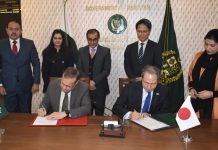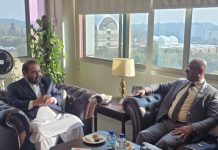Staff Report
ISLAMABAD: Minister for Religious Affairs and Interfaith Harmony, Chaudhry Salik Hussain on Tuesday urged to contemplate the eternal wisdom embedded in the life of Prophet Muhammad (Peace Be Upon Him), particularly regarding the state’s educational system.
Addressing the closing session of the Seerat-un-Nabi Conference 2024 on 12th Rabi-ul-Awwal, he underscored the undeniable role of education in shaping a just, moral, and prosperous society as the teachings of Prophet Muhammad (Peace Be Upon Him) offer a perfect model for bringing about an educational revolution in the nation.
Reflecting on the earlier session of the conference, Minister Salik highlighted the comprehensive discussions held on the theme “The Education System of the State in Light of Seerat-un-Nabi (Peace Be Upon Him),” which enlightened the participants’ hearts and minds.
He said the scholars provided a clear road-map for the development of the state’s education system based on the teachings of the Prophet (Peace Be Upon Him).
He emphasized that the involvement of esteemed scholars and intellectuals from across Pakistan made this conference not only an important academic event but also a pivotal one in terms of religious and intellectual development.
Minister Salik also congratulated the scholars who were recognized and awarded during the conference for their valuable contributions to the study of Seerat-un-Nabi (Peace Be Upon Him). He noted that these scholars represent a great intellectual asset, and their research will soon be available in book form.
The foundation of the educational system in an Islamic state, he reminded the audience, is based on the first revelation received by the Prophet (Peace Be Upon Him).
The minister recited the verses from Surah Al-Alaq to emphasize the significance of knowledge and literacy in human development. These verses, he said, serve as a cornerstone for human progress and highlight the importance of acquiring knowledge, literacy, and education.
The minister lauded the teaching methods of Prophet Muhammad (Peace Be Upon Him), who was not only a divine messenger but also an unparalleled educator. He said the Prophet (Peace Be Upon Him) approach to teaching was based on compassion, wisdom, and practical guidance, emphasizing that acquiring knowledge is a religious obligation for every Muslim, as stated in the hadith: “Seeking knowledge is obligatory upon every Muslim.”
This hadith, he explained, places a collective responsibility on the state to ensure that education is accessible to all, irrespective of gender, wealth, or ethnicity. In an Islamic state, he said it is crucial to create an environment where every individual has the opportunity to learn and grow, thereby contributing positively to society.
Furthermore, Minister Salik stressed the importance of knowledge that benefits others, quoting the hadith: “The best among you are those who are most beneficial to others.”
In light of this hadith, he said, the education system should not only provide theoretical knowledge but also emphasize practical skills and moral values that empower individuals to serve society. Education should foster responsibility, empathy, and a sense of service in individuals so that they are prepared to actively contribute to the nation’s progress, he added.
Highlighting the holistic approach to education in Seerat-un-Nabi (Peace Be Upon Him), Minister Salik emphasized the importance of character building. The Prophet Muhammad (Peace Be Upon Him) was sent as a mercy to all of humanity, and his life exemplified the highest moral standards. He recited the verse: “And indeed, you are of a great moral character.”
He said an education system inspired by the life of the Prophet (Peace Be Upon Him) should prioritize both knowledge and character development. It should teach virtues such as honesty, humility, patience, and justice, he added.
The minister reminded the audience of the hadith: “The example of the one who teaches people good but forgets it himself is like a lamp which illuminates others while it burns itself.”
This hadith, he said, serves as a reminder that education should lead to self-improvement and action. He said a state following the Prophetic model will ensure that its educational institutions not only produce knowledgeable individuals but also those who practice what they have learned.
Minister Salik also emphasized the importance of inclusive education adding that prophet Muhammad (Peace Be Upon Him) encouraged the education of all members of society, including women and marginalized groups. He cited the hadith: “Whoever raises two daughters properly will be with me in Paradise.”
He said this hadith highlights the critical role of women’s education, as they are essential in nurturing future generations. He said an Islamic state must ensure that women have equal access to education and are empowered to contribute to the nation’s social, economic, and spiritual development.
In his concluding remarks, Minister Salik said an Islamic state’s educational system should be based on the principles derived from the life of Prophet Muhammad (Peace Be Upon Him).
He said it should prioritize the acquisition of knowledge, character building, and the practical application of knowledge for the benefit of society. He said by doing so, the state will not only fulfill its duty to its citizens but also uphold the legacy of the Prophet (Peace Be Upon Him), who was a model of excellence in education.
Minister Salik concluded with a prayer, asking Allah to grant the nation success in building an educational system inspired by the principles of Seerat-un-Nabi (Peace Be Upon Him) and to bless Pakistan with prosperity and moral integrity.
He urged everyone to take the lessons learned from this conference and work collectively to establish an education system that fosters knowledgeable, moral, and responsible individuals who contribute to the nation’s progress.
Finally, he praised the Chief Justice of Pakistan and the scholars, particularly Mufti Taqi Usmani and Mufti Muneeb-ur-Rehman, for their efforts in upholding the belief in the Finality of Prophethood through the Supreme Court’s ruling.
He stressed that as Muslims, the ultimate guidance in solving contemporary issues lies in following the Seerat of Prophet Muhammad (Peace Be Upon Him).






